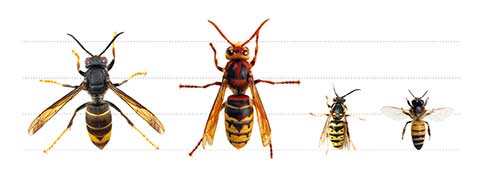Asian hornet nests
The Asian hornet kills and eats bees and is a significant threat to all UK pollinators including:
- bumble bees
- honey bees
- hover flies
- solitary bees

(from left to right, the Asian hornet, European hornet, wasp and honey bee)
Nests are on the increase and can be at low levels and in treetops. Do not approach or disturb a nest. The Asian hornet will sting if disturbed.
The Asian hornet is not yet established in the UK. The more people that can get involved to protect Enfield’s Green Spaces and wildlife the better.
The Enfield Beekeepers’ Association is co-ordinating efforts to spread awareness and encourage the trapping and recording of sightings of Asian hornets. As a non-native species, it is important that a nest can be located by the National Bee Unit.
We would encourage Enfield residents to:
- download the free Asian Hornet Watch app on your mobile phone to inform and assist with identification and reporting
- create your own monitoring trap and check regularly from spring to November - ideally, position the trap high up in the sun, on the ivy, facing south
- report the trap location post code, contact name, and phone number to Enfield Beekeepers’ Association
If you find an Asian hornet in your trap, don’t let it out. Take a photo, report it on the app, keep it in a safe place and wait for a response. You will be told the next steps.
Asian hornets and native pollinators favour ivy in autumn - this produces large quantities of nectar and pollen. If you walk the same route regularly, for example, when you're walking your dog, please check the ivy on the way.
If you see an Asian hornet nest, or an Asian hornet resting, or flying, take a photo and report it on the app. If the hornet flies away, try to remember the direction it flew in.
European hornets are not a concern.